Find Help
More Items From Ergsy search
-
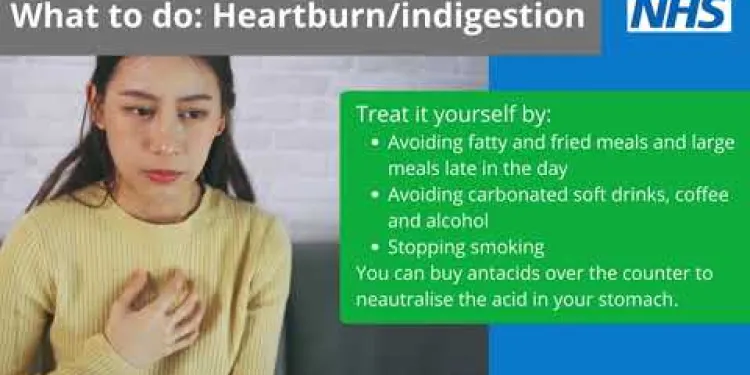
What to do if you have heartburn or indigestion
Relevance: 100%
-
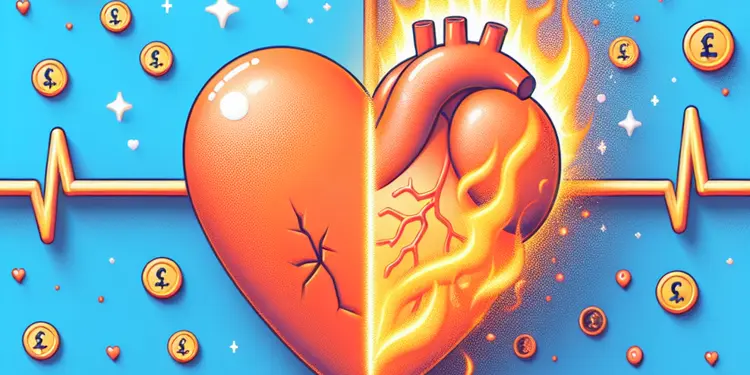
How can I differentiate between heartburn and a heart attack?
Relevance: 50%
-

What conditions is Omeprazole used to treat?
Relevance: 29%
-

Heart Attack Symptoms - Help Us Help You | NHS
Relevance: 25%
-
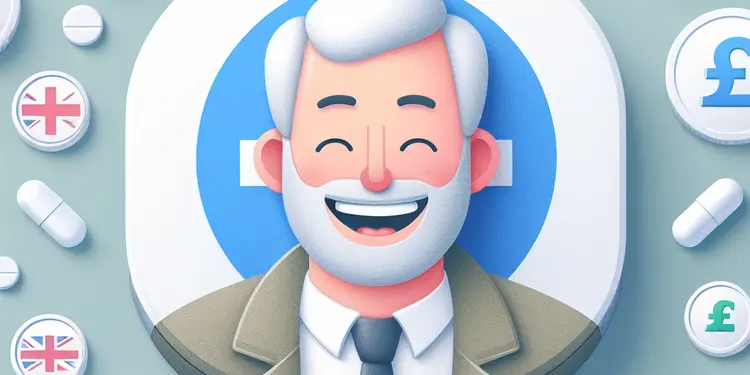
What is the drug Omeprazole?
Relevance: 17%
-

Is Omeprazole available over the counter?
Relevance: 16%
-

What are common side effects of Ozempic?
Relevance: 16%
-

What are some common conditions treated with homeopathy?
Relevance: 14%
-

Is it possible to have a heart attack without chest pain?
Relevance: 12%
-

How does Omeprazole work?
Relevance: 12%
-

Heart Attack Stories | NHS
Relevance: 12%
-
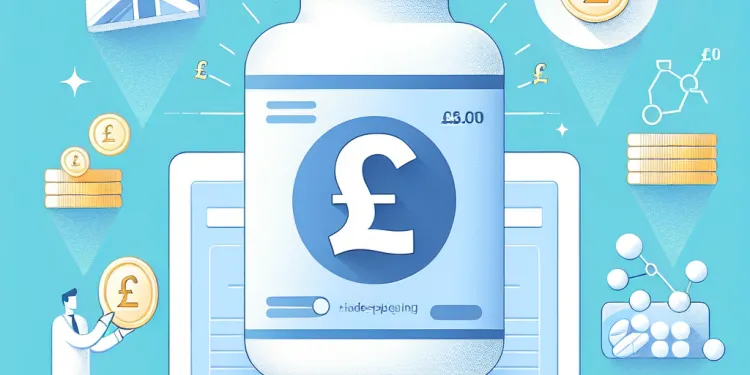
What are the side effects of Aspirin?
Relevance: 10%
-
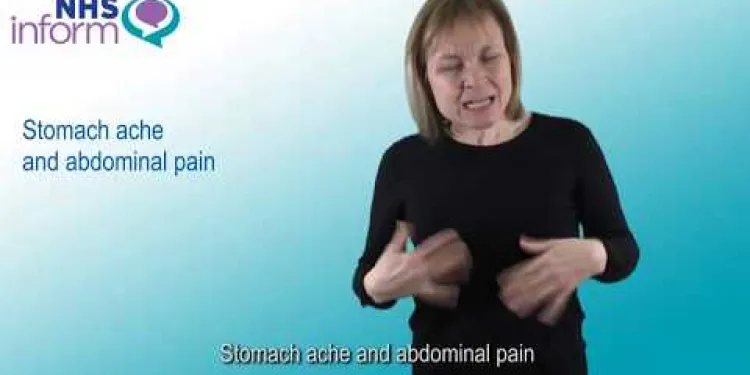
Stomach ache and abdominal pain
Relevance: 10%
-

Bournemouth Digestive Diseases Centre: Gastroscopy Procedure (Subtitled)
Relevance: 10%
-

What are some signs of poor gut health?
Relevance: 10%
-

Heart Attack Symptoms - Peter Dale (Tubes) | NHS - BSL version
Relevance: 9%
-

Heart Attack Symptoms - Peter Dale (Tubes) | NHS
Relevance: 7%
-

Are heart attack symptoms different for people with diabetes?
Relevance: 7%
-

What are the side effects of Ozempic?
Relevance: 7%
-

What is Aspirin?
Relevance: 7%
-
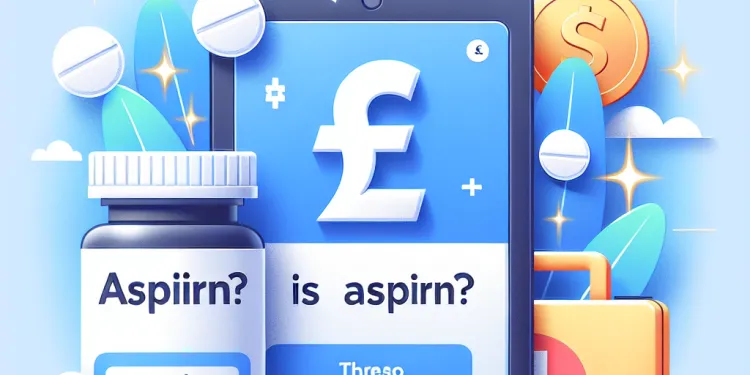
What is Aspirin?
Relevance: 6%
-

What is Ibuprofen?
Relevance: 6%
-

Can I use Ibuprofen for menstrual pain?
Relevance: 6%
-

How long do heart attack symptoms last?
Relevance: 6%
-

Where is the pain located when you have appendicitis?
Relevance: 6%
-

What are common side effects of Wegovy?
Relevance: 6%
-

What is junk food and how bad is it for health?
Relevance: 6%
-

Why is fiber important for gut health and aging?
Relevance: 6%
-

Endoscopy Introduction - The Patient Journey
Relevance: 6%
-
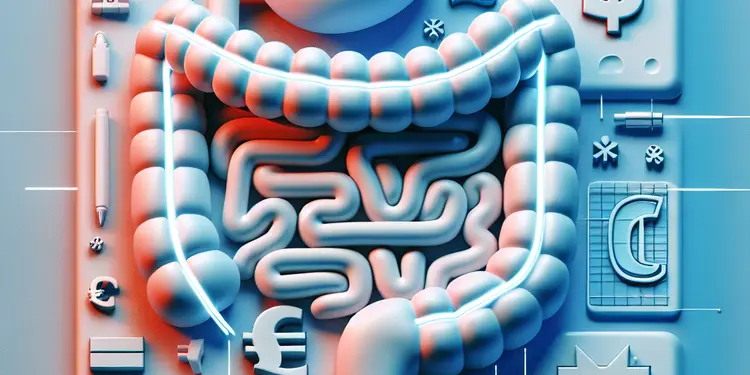
Are there specific gut-related diseases that become more common with age?
Relevance: 6%
-

What can high levels of cortisol cause?
Relevance: 6%
-

What lifestyle changes can help manage sleep apnea?
Relevance: 6%
-

Is it possible for alcohol alone to cause similar symptoms?
Relevance: 6%
-

Can fiber help with weight management?
Relevance: 6%
-

Does stress impact gut health as we age?
Relevance: 6%
-

Heart Attack Stories | NHS
Relevance: 6%
-

Can heart attack symptoms vary by age?
Relevance: 6%
-

Ovarian cancer - signs and symptoms to look out for
Relevance: 5%
-

Endoscopy Unit
Relevance: 5%
-

Symptoms of coeliac disease
Relevance: 4%
What to Do If You Have Heartburn or Indigestion
Heartburn and indigestion are common ailments that affect many people in the United Kingdom. These conditions can be uncomfortable, but there are several steps you can take to alleviate the symptoms and prevent them from recurring. Here’s what you need to know.
Identify Your Symptoms
Before taking any action, it's important to identify whether your discomfort is due to heartburn or indigestion. Heartburn is a burning pain in your chest, often after eating, while indigestion can include bloating, nausea, or an uncomfortable fullness. Recognising the symptoms can help you choose the best course of action.
Modify Your Diet
One of the most effective ways to manage heartburn and indigestion is by adjusting your diet. Avoid foods and drinks that can trigger symptoms, such as spicy foods, fatty foods, caffeine, alcohol, and carbonated beverages. Instead, opt for a balanced diet with smaller, more frequent meals to prevent overloading your digestive system.
Over-the-Counter Remedies
In the United Kingdom, many over-the-counter medications can help relieve heartburn and indigestion. Antacids, such as Gaviscon and Rennie, neutralise stomach acid and provide quick relief. H2 blockers, like ranitidine, and proton pump inhibitors (PPIs), such as omeprazole, reduce the amount of acid your stomach produces. Always follow the instructions on the packaging and consult a pharmacist if you have any questions.
Lifestyle Changes
Simple lifestyle changes can also significantly reduce the frequency and severity of heartburn and indigestion. Maintain a healthy weight, as excess weight can put pressure on your abdomen. Avoid lying down immediately after eating and try to eat at least three hours before bedtime. Elevating the head of your bed by about 15–20 cm can also help prevent nighttime symptoms.
When to Seek Medical Help
If your symptoms persist despite making these changes, or if you experience severe pain, difficulty swallowing, weight loss, or vomiting, it's crucial to seek medical advice. Chronic heartburn and indigestion can be signs of a more serious condition, such as gastroesophageal reflux disease (GERD) or a peptic ulcer, that requires professional treatment.
Conclusion
Managing heartburn and indigestion involves a combination of dietary adjustments, over-the-counter remedies, and lifestyle changes. By identifying triggers and making proactive changes, you can reduce discomfort and improve your quality of life. If symptoms persist, don’t hesitate to consult a healthcare professional for further advice.
What to Do If You Have Heartburn or Indigestion
Heartburn and indigestion can make your tummy feel bad. Lots of people in the UK feel this way. It might hurt, but you can do things to feel better. Here is how you can help yourself.
Know Your Symptoms
First, you need to know how you feel. Heartburn feels like a burn in your chest, usually after you eat. Indigestion can make you feel full, sick, or bloated. Knowing how you feel can help you decide what to do.
Change What You Eat
What you eat can make a big difference. Stay away from spicy foods, fatty foods, caffeine, alcohol, and fizzy drinks. Try to eat healthy and have smaller meals more often. This helps your tummy not work too hard.
Medications You Can Buy
In the UK, you can buy medicines that help with heartburn and indigestion. Antacids like Gaviscon and Rennie make stomach acid less strong and help fast. H2 blockers and PPIs lower the acid your tummy makes. Always read the instructions and ask a pharmacist if you're unsure.
Change Your Habits
Simple changes can help too. Keep a healthy weight, as extra weight can press on your tummy. Don’t lie down after eating and try not to eat right before bed. Raising your bed a bit can help at night.
When to Get Help
If you still feel bad after trying these things, or if you have bad pain, trouble swallowing, lose weight, or vomit, see a doctor. It might be something more serious like GERD or an ulcer, and you will need help from a doctor.
Conclusion
To feel better, try changing what you eat, taking medicine you can get at the store, and adjusting your habits. Knowing what makes you feel bad and making changes can help you feel good again. If you don’t get better, talk to a doctor for more help.
Frequently Asked Questions
What is heartburn?
Heartburn is a burning sensation in your chest, just behind your breastbone. It's typically caused by acid reflux, which happens when stomach acid moves up into your esophagus.
What causes indigestion?
Indigestion can be caused by overeating, eating too quickly, fatty or greasy foods, stress, alcohol, caffeine, and certain medications.
How can I prevent heartburn and indigestion?
To prevent heartburn and indigestion, avoid trigger foods, eat smaller meals, don’t lie down after eating, elevate your head while sleeping, and manage stress.
Are over-the-counter medications effective?
Yes, over-the-counter medications like antacids, H2 blockers, and proton pump inhibitors (PPIs) can be effective in relieving symptoms.
When should I see a doctor for heartburn?
You should see a doctor if you experience severe or frequent heartburn, have difficulty swallowing, or if over-the-counter medications do not provide relief.
Is heartburn the same as GERD?
Heartburn is a symptom of GERD (Gastroesophageal Reflux Disease), but not everyone who suffers from heartburn has GERD.
Can stress cause indigestion?
Yes, stress can contribute to indigestion by increasing stomach acid production and slowing digestion.
Is it safe to use baking soda for heartburn relief?
Baking soda can provide temporary relief for heartburn by neutralizing stomach acid, but it should not be used frequently as it can cause side effects.
Can lifestyle changes help with indigestion?
Yes, lifestyle changes such as eating a healthy diet, exercising, avoiding tobacco, and reducing alcohol and caffeine can help manage indigestion.
What are common foods that trigger heartburn?
Common heartburn triggers include spicy foods, citrus fruits, tomatoes, chocolate, garlic, onions, and fatty or fried foods.
Can drinking water help with heartburn?
Drinking water can help dilute stomach acid and provide temporary relief, but it is not a long-term solution for heartburn.
Is heartburn common during pregnancy?
Yes, heartburn is common during pregnancy due to hormonal changes and pressure on the stomach from the growing uterus.
What role does weight play in heartburn and indigestion?
Excess weight can increase pressure on the stomach and lower esophageal sphincter, leading to increased risk of heartburn and indigestion.
Can certain medications cause indigestion?
Yes, medications such as NSAIDs, aspirin, certain antibiotics, and bisphosphonates can cause indigestion.
Is it harmful to ignore heartburn symptoms?
Ignoring heartburn can lead to complications such as esophagitis, esophageal ulcers, or Barrett’s esophagus, so it's important to address persistent symptoms.
What is heartburn?
Heartburn is a burning feeling in your chest. It can happen after you eat.
Here are some tips to help:
- Eat slowly and chew your food well.
- Don’t lie down right after eating.
- If it hurts often, tell a grown-up or a doctor.
Heartburn feels like a burning in your chest. This is just behind the bone in the middle of your chest. It usually happens when stomach acid goes up into the tube that connects your mouth and stomach (esophagus).
What makes it hard to digest food?
Indigestion is when your tummy hurts because of these things:
- Eating too much food
- Eating too fast
- Eating fatty or greasy food
- Feeling stressed or worried
- Drinking alcohol
- Drinking drinks with caffeine like soda or coffee
- Taking some medicines
To feel better, try eating slowly and choosing healthier foods. Relax, and talk to a grown-up if you need help.
How can I stop heartburn and indigestion?
Heartburn is when your chest feels like it’s burning. Indigestion is when your tummy hurts. Here are some ways to stop these feelings:
- Eat slowly and chew your food well. Take your time when eating.
- Don’t eat big meals. Eat smaller meals during the day.
- Avoid spicy or greasy foods. These can make your tummy hurt.
- Try not to eat close to bedtime. Eat at least 2-3 hours before you go to sleep.
- Drink water instead of fizzy drinks. Fizzy drinks can cause heartburn.
- Wear loose clothes. Tight clothes can press on your tummy.
- Ask an adult or a doctor for advice if you need help.
Using these tips can help keep your tummy happy.
To stop heartburn and tummy ache:
- Don't eat foods that upset your tummy.
- Eat small meals.
- Don't lie down after you eat.
- Sleep with your head raised up.
- Stay calm and not stressed.
Using a pillow to raise your head while you sleep helps. You can try deep breathing to feel calm.
Do medicines from the shop work?
Sometimes, you can buy medicines from a shop without a doctor's help. Do these medicines help you feel better?
If you are not sure, you can:
- Ask a pharmacist. They can tell you about the medicine.
- Use the internet to find more information.
- Talk to friends or family who used the medicine.
Always read the instructions that come with the medicine. If it doesn't work, talk to a doctor.
Yes, some medicines you can buy at the store can help with heartburn. These include antacids, H2 blockers, and proton pump inhibitors (PPIs).
When is it time to talk to a doctor about heartburn?
Heartburn can make your chest feel like it's burning. It's important to know when you should ask a doctor for help.
- If the burning feeling happens more than two times a week, talk to a doctor.
- If the pain is very bad or won't go away, tell a doctor.
- If it is hard to eat or swallow, let a doctor know.
- If medicine you take does not help, ask a doctor what to do.
Helpful tools:
- Keep a diary. Write down when your heart hurts and what you eat.
- Use pictures or drawings to show how you feel.
You should go to the doctor if:
- You have bad heartburn a lot.
- You find it hard to swallow.
- Medicine from the shop doesn’t help you feel better.
Use a symptom tracker to write down how you feel. Taking notes can help you explain your symptoms to the doctor.
Are heartburn and GERD the same?
No, they are not the same.
Heartburn: It is a burning feeling in your chest. It happens when stomach acid goes up into your throat.
GERD: This stands for Gastroesophageal Reflux Disease. It means you have heartburn often and it might hurt your throat over time.
Helpful tools: Use pictures to understand better. Ask someone to explain if you are unsure.
Heartburn is when your chest feels hot or hurts. It can mean you have something called GERD, which is a tummy problem. But not everyone with heartburn has GERD.
Can being worried make your tummy hurt?
Yes, feeling stressed can make your tummy hurt. Stress can make your body produce more acid in your stomach. This acid can upset your tummy. Stress can also slow down how your body digests food, which can make your tummy feel bad.
Here is a tip to help:
- Try taking deep breaths or doing something relaxing when you feel stressed. This can help your tummy feel better.
- Using an app that plays calming sounds or guides you through breathing exercises can also help.
Can I use baking soda to help with heartburn?
Baking soda can help with heartburn for a short time. It works by stopping the stomach acid. But don't use it too much because it might cause problems.
Can changing your habits help with tummy pain?
Sometimes, your tummy might hurt because of what you eat or how you live.
Here are some simple changes you can try:
- Eat slowly and chew your food well.
- Eat smaller meals more often instead of big meals.
- Avoid spicy or greasy foods that upset your tummy.
- Don’t lie down right after eating. Wait a little while.
- Try to relax and not get too stressed.
Tools that can help:
- Use a timer to remind you to eat slowly.
- Keep a food diary to see which foods hurt your tummy.
- Do deep breathing or gentle exercises to help you relax.
If your tummy keeps hurting, talk to a doctor or someone who can help.
Yes, changing some things you do every day can help with tummy problems. Try to eat healthy food, exercise, stay away from smoking, and drink less alcohol and coffee.
What foods make heartburn worse?
Some foods can make your tummy burn, called heartburn.
Here are some common types of food that might cause heartburn:
- Spicy food, like hot sauce or chili
- Fried food, like fries or fried chicken
- Fatty food, like cheese or burgers
- Citrus fruits, like oranges or lemons
- Chocolate
- Garlic and onions
- Caffeinated drinks, like coffee or soda
- Alcohol
If you get heartburn, you can:
- Eat smaller meals
- Avoid lying down after eating
- Stay away from foods that give you heartburn
- Ask an adult for help if it hurts a lot
Some foods can cause heartburn. These foods are spicy food, citrus fruits like oranges, tomatoes, chocolate, garlic, onions, and fatty or fried foods.
Does drinking water stop heartburn?
Heartburn is a burning feeling in your chest. It can hurt and feel uncomfortable. Here are some simple ways to help:
- Drink a glass of water. This might cool down the feeling.
- Try to eat slowly and not have very big meals.
- Avoid spicy or very oily foods, as they might make heartburn worse.
Tools that can help:
- Use a timer to remind you to drink water during the day.
- Keep a diary of foods that cause heartburn, so you can avoid them.
Drinking water can help make stomach acid less strong. This might make you feel better for a little while. But, drinking water is not a good way to stop heartburn for a long time.
If you get heartburn a lot, it's good to talk to a doctor. They can help you find ways to feel better.
Do many pregnant women get heartburn?
Yes, lots of pregnant women feel heartburn. This is a burning feeling in your chest.
Here are some tips to help:
- Eat small meals.
- Avoid spicy or fatty foods.
- Don't lie down right after eating.
- Talk to your doctor if it does not get better.
These can make you feel better.
Yes, it is normal to get heartburn when you are pregnant. This is because your body is changing, and your baby is getting bigger and pushing on your stomach.
How does weight affect heartburn and indigestion?
Being too heavy can cause heartburn and indigestion. This is because extra weight can put pressure on your tummy, which can make you feel uncomfortable.
To help with heartburn, you can:
- Eat smaller meals.
- Stay away from spicy and fatty foods.
- Talk to a doctor or nurse for advice.
- Try gentle exercise, like walking.
Remember, it is important to look after your body. If heartburn or indigestion keeps happening, ask an adult for help.
If you have too much weight, it can push on your stomach. This makes the muscle at the top of your stomach weak. When this happens, you might feel heartburn and your stomach might hurt.
Can some medicines give you a tummy ache?
Yes, some medicines can upset your tummy. These include painkillers like aspirin and NSAIDs, some antibiotics, and a type of medicine for bones called bisphosphonates.
Can ignoring heartburn be bad for you?
If you ignore heartburn, it can cause problems. You might get a sore throat or even a sore in your food pipe. These are called esophagitis and esophageal ulcers. Sometimes, your food pipe can change too, and that's called Barrett’s esophagus. This is why you should pay attention if you keep having heartburn.
Useful Links
This website offers general information and is not a substitute for professional advice.
Always seek guidance from qualified professionals.
If you have any medical concerns or need urgent help, contact a healthcare professional or emergency services immediately.
Some of this content was generated with AI assistance. We’ve done our best to keep it accurate, helpful, and human-friendly.
- Ergsy carfully checks the information in the videos we provide here.
- Videos shown by Youtube after a video has completed, have NOT been reviewed by ERGSY.
- To view, click the arrow in centre of video.
- Most of the videos you find here will have subtitles and/or closed captions available.
- You may need to turn these on, and choose your preferred language.
- Go to the video you'd like to watch.
- If closed captions (CC) are available, settings will be visible on the bottom right of the video player.
- To turn on Captions, click settings .
- To turn off Captions, click settings again.
More Items From Ergsy search
-

What to do if you have heartburn or indigestion
Relevance: 100%
-

How can I differentiate between heartburn and a heart attack?
Relevance: 50%
-

What conditions is Omeprazole used to treat?
Relevance: 29%
-

Heart Attack Symptoms - Help Us Help You | NHS
Relevance: 25%
-

What is the drug Omeprazole?
Relevance: 17%
-

Is Omeprazole available over the counter?
Relevance: 16%
-

What are common side effects of Ozempic?
Relevance: 16%
-

What are some common conditions treated with homeopathy?
Relevance: 14%
-

Is it possible to have a heart attack without chest pain?
Relevance: 12%
-

How does Omeprazole work?
Relevance: 12%
-

Heart Attack Stories | NHS
Relevance: 12%
-

What are the side effects of Aspirin?
Relevance: 10%
-

Stomach ache and abdominal pain
Relevance: 10%
-

Bournemouth Digestive Diseases Centre: Gastroscopy Procedure (Subtitled)
Relevance: 10%
-

What are some signs of poor gut health?
Relevance: 10%
-

Heart Attack Symptoms - Peter Dale (Tubes) | NHS - BSL version
Relevance: 9%
-

Heart Attack Symptoms - Peter Dale (Tubes) | NHS
Relevance: 7%
-

Are heart attack symptoms different for people with diabetes?
Relevance: 7%
-

What are the side effects of Ozempic?
Relevance: 7%
-

What is Aspirin?
Relevance: 7%
-

What is Aspirin?
Relevance: 6%
-

What is Ibuprofen?
Relevance: 6%
-

Can I use Ibuprofen for menstrual pain?
Relevance: 6%
-

How long do heart attack symptoms last?
Relevance: 6%
-

Where is the pain located when you have appendicitis?
Relevance: 6%
-

What are common side effects of Wegovy?
Relevance: 6%
-

What is junk food and how bad is it for health?
Relevance: 6%
-

Why is fiber important for gut health and aging?
Relevance: 6%
-

Endoscopy Introduction - The Patient Journey
Relevance: 6%
-

Are there specific gut-related diseases that become more common with age?
Relevance: 6%
-

What can high levels of cortisol cause?
Relevance: 6%
-

What lifestyle changes can help manage sleep apnea?
Relevance: 6%
-

Is it possible for alcohol alone to cause similar symptoms?
Relevance: 6%
-

Can fiber help with weight management?
Relevance: 6%
-

Does stress impact gut health as we age?
Relevance: 6%
-

Heart Attack Stories | NHS
Relevance: 6%
-

Can heart attack symptoms vary by age?
Relevance: 6%
-

Ovarian cancer - signs and symptoms to look out for
Relevance: 5%
-

Endoscopy Unit
Relevance: 5%
-

Symptoms of coeliac disease
Relevance: 4%


